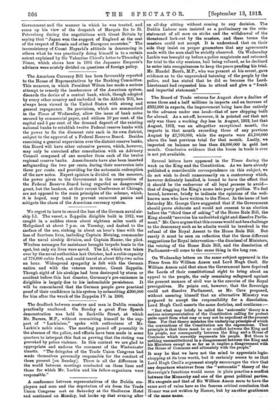The American Currency Bill has been favourably reported to the
House of Representatives by the Banking Committee. This measure, in which President Wilson has made a serious attempt to remedy the incoherence of the American system, discards the device of a central bank, which, though adopted by every other country and embodied in the Aldrich Bill, has always been viewed in the United States with strong and general repugnance. Its provisions, which are summarized in the Times of Wednesday, allow the issue of bank notes secured by commercial paper, and utilizes 10 per cent, of the capital and 5 per cent, of the demand deposit of the existing national banks to establish twelve Federal reserve banks with the power to fix the discount rate each in its own district, subject to the approval of a Federal Reserve Board. Besides exercising a general supervision over the district reserve banks, this Board will have other extensive powers, which, however, may only be exercised after consultation with an Advisory Council composed of one member from each of the twelve regional reserve banks. Amendments have also been inserted safeguarding the two per cents. during their conversion into three per cents. and providing for the automatic redemption of the new notes. Expert opinion is divided on the measure, the power given to the Government in the composition of the Federal Reserve Board being regarded as dangerously great, but the bankers, at their recent Conference at Chicago, are not opposed to the main principles of the scheme, which, it is hoped, may tend to prevent recurrent panics and mitigate the chaos of the American currency system.










































 Previous page
Previous page